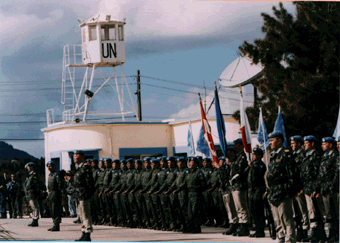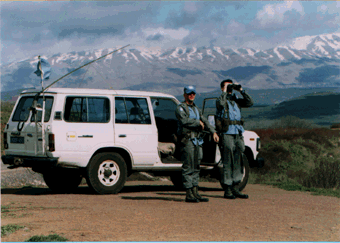Q&A ON JAPAN - U.S. RELATIONS
MIDDLE EAST
Q.How is Japan contributing to peace in the Middle East?
In the aftermath of the Cold War and Gulf War, the Middle East has experienced dramatic progress towards peace and the U.S. has exerted leadership in achieving the progress. Leading countries in the world should be instrumental in achieving peace in the Middle East, because peace in this region is important for the entire international community.
Since the Madrid Conference in October 1991, Japan has worked in many ways to help consolidate peace in the Middle East. These include providing support to the parties directly involved, as well as playing a major role, along with the United States, the European Union and other countries, in creating frameworks for regional cooperation at the Multilateral Track of the Middle East peace process, Middle East and North Africa Economic Summit, and other venues. Some of the specific measures Japan has taken are described below.
Participation in UNDOF
In February 1996, we dispatched transport and command personnel to provide transportation and other backup support to the United Nations Disengagement Observer Force (UNDOF), which is in charge of monitoring the separation of troops in the Golan Heights.


Support for the Palestinians
(1) In 1993, we announced that Japan would provide US$200 million in aid to the Palestinians during the two years of 1994 and 1995, and we have so far provided a total of US$184 million including US$ 10 million for housing support for Palestian police, US$ 5 million for Gaza Clean-up project and US$ 5 million for the road pavement project. The Japanese aid has been highly praised by the Palestinians, Israel, US and other donor countries, and international organizations. Stresses are put on the assistance to help cover the start-up expenses of the interim Palestinian self-government and projects designed to create jobs and establish infrastructure.
(2) We have also accepted 23 trainees in fiscal 1993, 73 in 1994 and 102 in 1995 to develop Palestinians' administrative skill and human resources in such fields as the environment and education.
(3) We also sent 77 election monitors - the largest contingent of any country - to oversee Palestinian Council elections, and contributed US$800,000 for election equipments. Furthermore, at the ministerial-level Conference for the support of the Palestinians held in January 1996, we pledged more than US$56 million by the end of March 1997.
Japan's Role in the Multilateral Track of the Middle East Peace Process
Japan chairs the Environment Working Group and co-chairs Working Groups on the Regional Economic Development, Water and Refugees. We are making particularly active contributions in the environmental and tourism fields. We were instrumental in formulating Environmental Code of Conduct for promoting regional cooperation to protect the environment in the Middle East. Bahrain Code of Conduct on the Environment was adopted at the Bahrain meeting of the Environment Working Group held at the end of October 1994). In the tourism field, we chaired the Tourism Workshop designed to foster regional cooperation, and took the lead in establishing the Middle East-Mediterranean Travel and Tourism Association. Some specific examples of Japan's contributions are given below.
- Upper Gulf of Aqaba Oil Spill contingency Project (Environment Working Group)
- Project to combat desertification (Environment Working Group)
- Conference and symposium on promoting tourism in the Middle East (Tourism Workshop)
Assistance to the Arab parties of the Middle East Peace Process
To provide the underpinnings for the Middle East Peace Process, we place a high priority on economic assistance to the Arab contries of the area. (Egypt, Jordan, Syria, and Lebanon).
(1) Egypt
- Egypt receives the most Japanese ODA of any country in the Middle East.
- We provided approximately ¥8.4 billion (US$ 79 million) grants in fiscal 1994.
- We implemented technical cooperation at Cairo University Pediatric Hospital and at Cairo University High Institute of Nursing. We also implemented third-country training programs for Palestinians in the field of construction machinery maintenance.
(2) Jordan
- Japan is Jordan's principal donor country.
- We provided approximately ¥3.3 billion (US$ 34 million) grants in fiscal 1995.
- We provided loan of ¥13.1 billion (US$ 124 million) for the Expansion Program at the Aqaba thermal power plant and the Energy Sector Adjustment Program in fiscal 1994. We also provided approximately US$ 215 million loan to stabilize the Jordanian currency and a loan of ¥108.1 billion (US$ 106.3 million) for the implementation of the Aqaba thermal power plant station stage II project in fiscal 1995.
- We implemented the technical cooperation in such fields as health, medicine, communications, and agriculture. We also implemented third-country training programs for Palestinians in the electric power field.
(3) Syria
- Japan is Syria's principal donor country.
- We provided approximately ¥2.4 billion (US$ 23 million) grants in fiscal 1994.
- We also provided loan of approximately ¥46.2 billion (US$ 471 million) for the Al Zara thermal power plant in fiscal 1995.
(4) Lebanon
- We had our diplomats return to Beirut on February 6, 1995.
- We dispatched an economic cooperation survey team in May 1995, and a government survey team regarding yen loan in June 1995.
- We are considering implementation of economic cooperation.
Middle East Peace Process Chronology
November 1947
United Nations General Assembly Resolution 181 adopted, partitioning Palestine.
May 1948
Establishment of Israel is announced.
May 1948
The Palestinian War. (Invasion Arab forces of Israel started)
October 1956
The Suez Crisis. (arisen out of Egypt's nationalization of the Suez Canal)
June 1967
The Six-Day war. (Israel invaded the West Bank and Gaza, Sinai Peninsula and Golan Heights.)
October 1973
The October war. (OPEC strategy to raise oil prices results in oil crisis)
September 1978
The United States, Egypt and Israel sign the Camp David Accords.
March 1979
Israel-Egypt Peace Treaty signed.
October 1991
Madrid Middle East Peace Conference convened (marking the beginning of the Middle East Peace Process)
January 1992
Multilateral Track Conference of the Middle East Peace Process convened in Moscow.
September 1993
Israel-PLO Declaration of Principles on Interim Self-Government Arrangements signed.
October 1993
Ministerial-level Conference on the Support of Middle East Peace Process convened.
May 1994
Israel and PLO sign the Gaza-Jericho Agreement.
September 1994
Washington Treaty signed by Israel and Jordan.
October 1994
Israel-Jordan peace treaty signed.
September 1995
Israeli-Palestinian Imterim Agreement on the West Bank and the Gaza Strip Signed. Then-Foreign Minister Kono gives a speech.
January 1996
- Ministerial-level Conference for the support of the Palestinians convened.
- Palestinian Council elections held.
February 1996
Japan dispatches transport troops and command personnel to back up UNDOF activities on the Golan Heights.
March 1996
Foreign Minister Ikeda attends the Summit of Peacemakers in the Middle East, where he pledges US$10 million in emergency aid to help create jobs.
Japan's Assistance to support the Palestinians
1996.4.1
(MILLION US DOLLARS)
| AGENCIES | FY 1993 | FY 1994 | FY 1995 | TOTAL |
|---|---|---|---|---|
| UNDP JAPAN- PALESTINE DEVELOPMENT FUND | 20(including 3.5earmarke to the Holst Fund) | 17.5 | 23.5 (including 3.5 earmarked to the Holst Fund) | 61 |
| THE HOLST FUND | 5 | 3 | 8 (15 together with 7 from UNDP) | |
| UNRWA | 16.5 | 17.5 | 23.5 | 57.5 |
| FOOD ASSISTANCE | 9.43 | 9.4 | 18.83 | |
| WORLD BANK TRUST FUND | 5 | 5 | ||
| ICRC | |
1 | 1 | 2 |
| WHO | 5.4 | ---- | ---- | 5.4 |
| THE JAPAN RED CROSS | 2.5 | ---- | ---- | 2.5 |
| GRASSROOTS PROJECTS | 0.22 | 0.39 | 0.95 | 1.56 |
| TOTAL FOR ASSISTANCE THROUGH Int.NATIONAL ORGANIZATION | about 50 (administ- rative funding) (20) | about 50.82 (16.75) | about 61.35 (12.5) | about 162 (49.25) |
| TOTAL FOR THE DIRECT AID (GRANT ) | ---- | ---- | 21.73 0.8 (elections) |
21.73 0.8 (elections) |
| TOTAL | about 50 | about 50.82 | about 83.1 | about 184 |
| OTHERS | -Japan sent a group of 77 people,
including members of the Diet, to serve as international
election observers, and also provided about US 0.8
million for the election goods. -Japan intends to conduct training for 102 Palestinians over FY1995 in such sectors as government administration, electricity and construction, inviting them to Japan as well as to such third countries as Egypt and Jordan. |
|||
Back to Index
